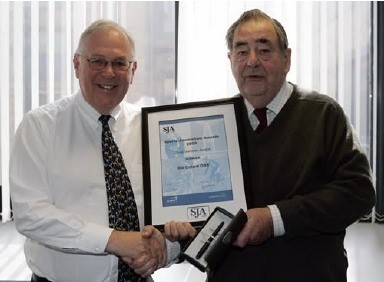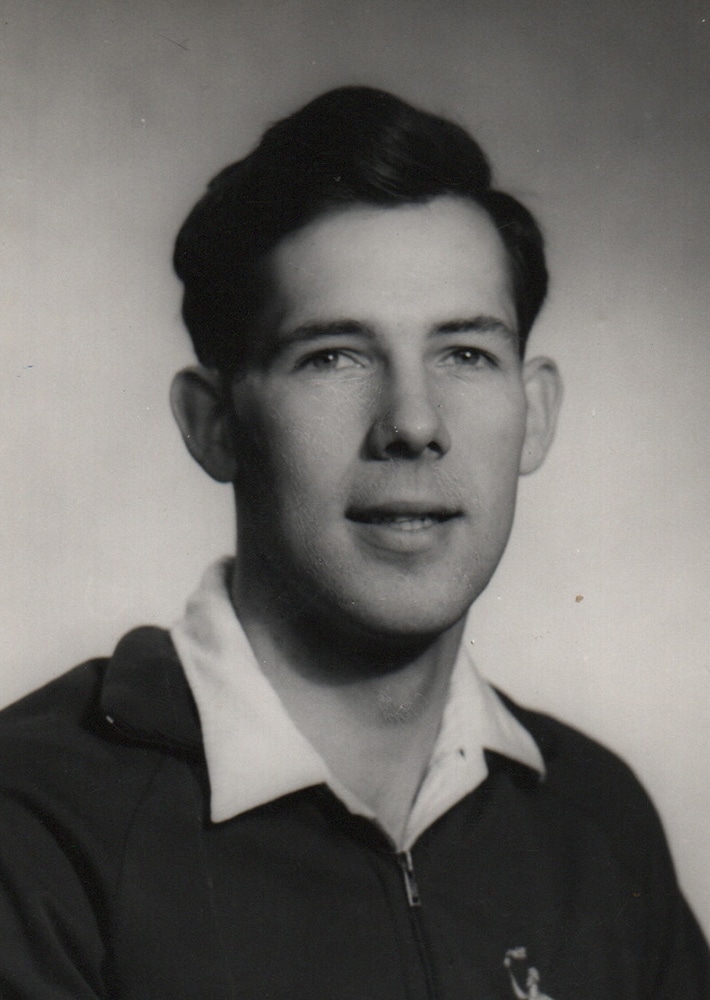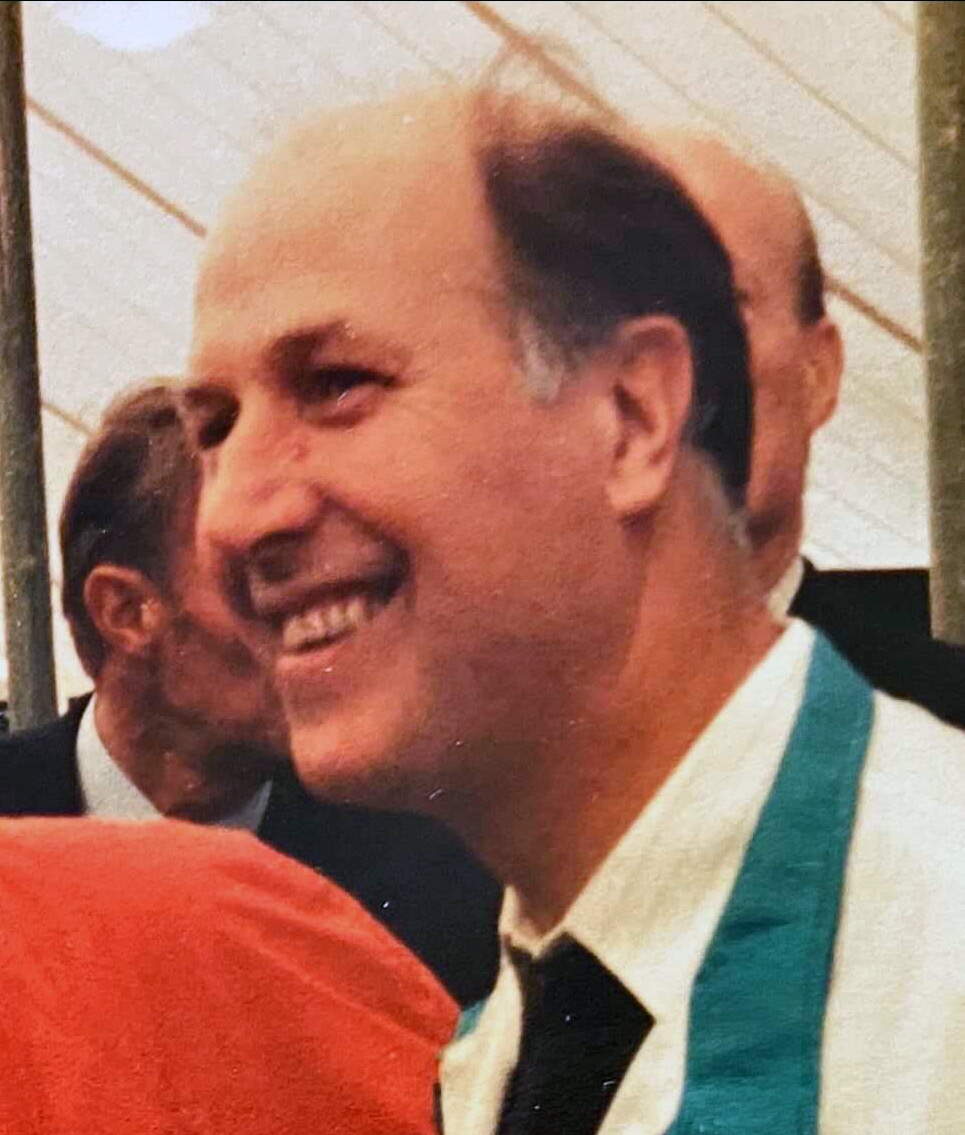05.10.1940-15.06.2025Fscotland
The Hockey Museum is saddened to learn of the passing of Dennis Hay, who died at home in Edinburgh at the age of 84. A towering figure in British and Scottish hSockey, Dennis leaves behind a legacy of excellence, leadership, and inspiration that has shaped generations of players and coaches.
Born in Aberdeen, Dennis was a gifted midfielder who represented both Scotland and Great Britain (15 GB caps, 1966-1972) with distinction. His international playing career took in the 1972 Olympic Games in Munich and a decade-long run as a mainstay in Scotland’s midfield from 1964 to 1974, missing only one match. He was also part of Scotland’s first men’s indoor team in Paris in 1973.
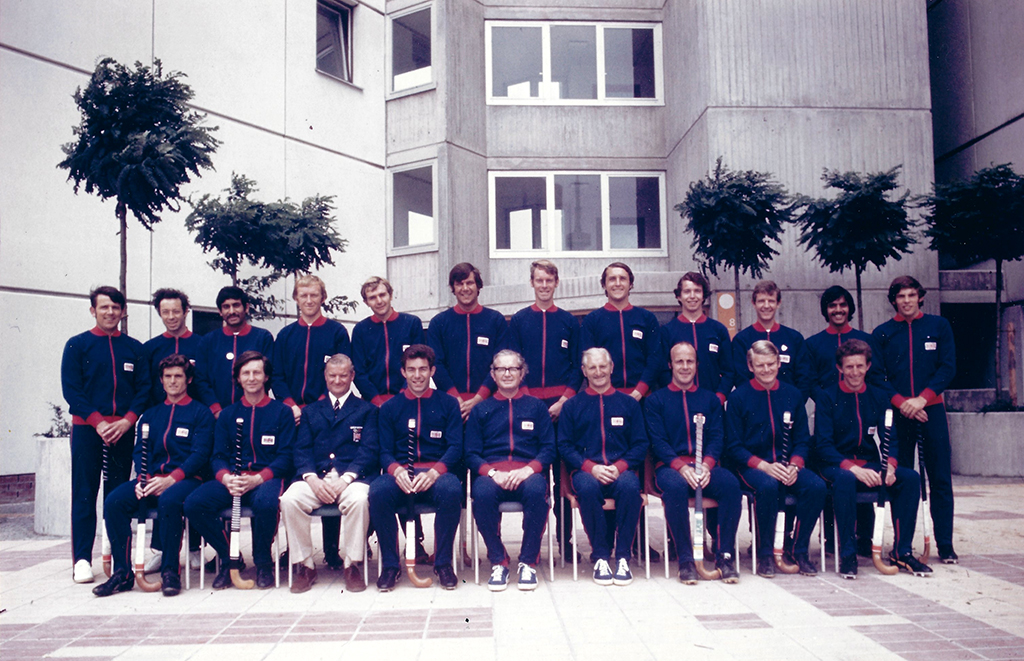
The Great Britain men’s hockey team at the 1972 Olympic Games in Munich. Dennis Hay is seated furthest right.
Following his playing days, Dennis transitioned seamlessly into coaching, where his analytical mind and deep understanding of the game flourished. He led the Scottish women’s team to the 1983 Hockey World Cup in Kuala Lumpur and later guided the GB women’s team to a historic bronze medal at the 1992 Olympic Games in Barcelona – the first Olympic medal for a GB women’s hockey side. His achievements made him the only Scotsman to have played, coached, and medalled at the Olympic Games.
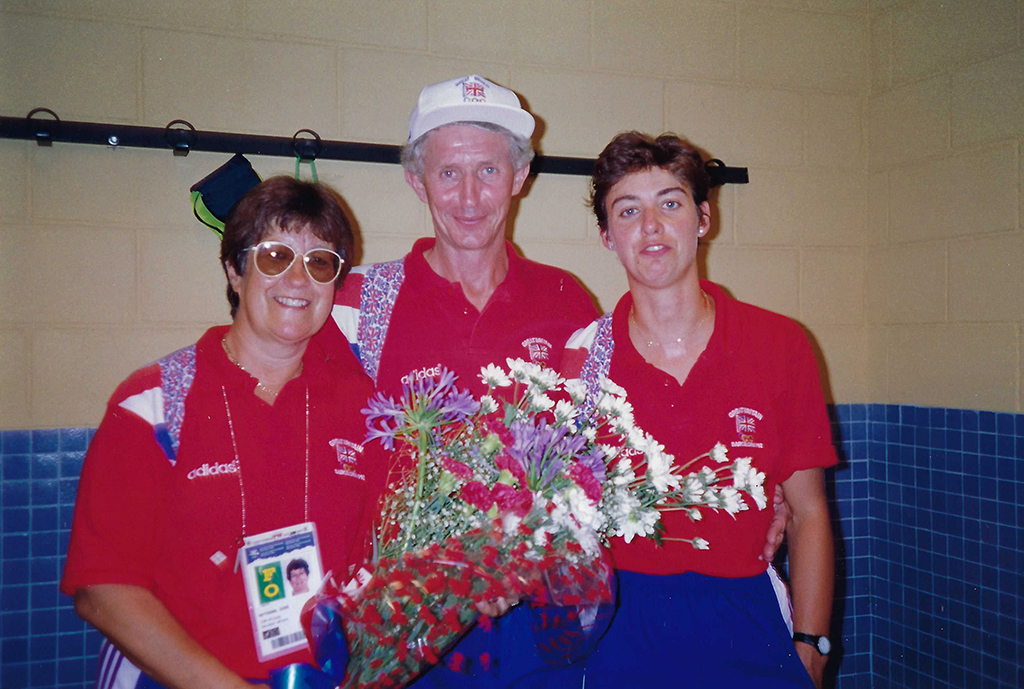
Great Britain women’s coach Dennis Hay with Di Batterham (manager; left) and Lynne Booth (physiotherapist; right) at the Barcelona Olympic Games in 1992 where Great Britain women won the bronze medal.
Dennis’s influence extended far beyond the international stage. He was a passionate educator and mentor, serving as Director of Coaching at the University of Edinburgh from 2000, where he built a thriving hockey programme. He served as Honorary President of Edinburgh University Hockey Club until 2015 where he is remembered as a “father of the club”.
Prior to joining Edinburgh, Dennis was a beloved teacher at Perth Grammar School and a stalwart of Perth Hockey Club men’s First Team. He was later coach and Honorary Vice-President of what became Perthshire Hockey Club following its amalgamation.
An author and innovator, in 2009 Dennis collaborated with sprints coach Stuart Dempster to publish a book titled 101 Youth Hockey Drills. The book provides training drills based on movement patterns in hockey, a resource that continues to benefit coaches and players alike.
Above all, Dennis Hay will be remembered for his humility, warmth, and unwavering commitment to the sport he loved. His influence lives on in every hockey player or coach who enjoyed the pleasure of his insight and drew confidence from his mentorship.
Tributes from across British hockey speak to Dennis’s character and impact. Read these in full below.
You can watch the Scottish Hockey Heritage Group’s four-part oral history interview with Dennis (produced in partnership with the Half Court Press) on their website. His life in hockey in his own words.
Oral History | ScottishHockeyHeritage.org

Dennis Hay receives his Great Britain honours cap from GB Hockey President Sheila Morrow.
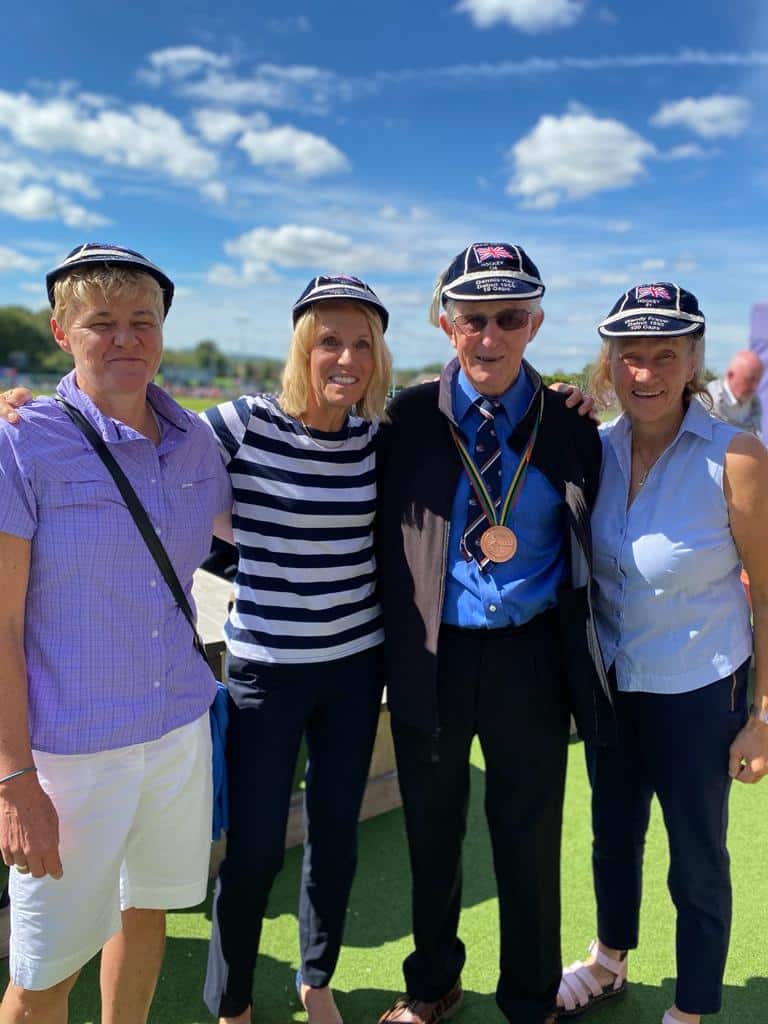
GB Cap Presentations at Uddingston HC in August 2022. Dennis Hay with the Scottish members of the 1992 Barcelona Olympic team. From left to right: Sue Fraser, Alison MacFarlane (nee Ramsey), Dennis Hay, Wendy Justice (nee Fraser).
Photograph courtesy Alison MacFarlane.
Contributions from fellow players
Ordered chronologically across Dennis Hay’s hockey career.
Great Britain men’s tour to Australia 1966
“He was an excellent player and a great team man.”
“Dennis had his finger broken in the first match and was unable to play again on the tour. He took the disappointment very well and never complained.”
Scotland and Great Britain men
“Dennis was one of my oldest friends, we played hockey together for a number of different teams over the years. He was an analytical thinker when it came to hockey and this is a reason why he achieved so much as a coach. The hockey world is a poorer place as a result of his passing.”
“It was with great sadness that I learned of the passing of my coaching mentor and friend, Dennis Hay. For Scottish – and indeed British – hockey, Dennis was a towering figure: a gifted player, a visionary coach, and an inspirational teacher whose legacy will shape the sport for generations.
As a player, Dennis represented Scotland in three consecutive victories over England, then wore GB colours at the 1972 Munich Games—an event overshadowed by tragedy, yet one he faced with characteristic composure.”
Perthshire Hockey Club
“He taught at Perth Grammar; what a privilege that was to have both him and Marietta in the PE Department and then to go on to be coached in various hockey teams by him.”
“Dennis was a great asset to the club in the early days of Perthshire. He was the hardest reverse stick tackler I have ever played with or against in 60 years of club hockey as far as I can remember.”
Coaching
“When Scotland lacked formal coaching structures, Dennis stepped in. He took the Scotland Midlands women’s side under his wing and steered the national team to its first European Indoor final.”
“He was always serious about hockey, and this coupled with recognition that we as players were improving elicited, I believe, a willingness to be better so as not to let Dennis down or indeed face his scowl. All that Dennis coached in us, those of us who have coached, I believe passed on the Dennis’s legacy to the next generations.”
Great Britain women
“As head coach of GB women, he achieved fourth place at Seoul 1988 before delivering that remarkable bronze in Barcelona – making him the only Scotsman to have played, coached, and medalled at the Olympic Games.”
“He guided Great Britain’s women to an historic bronze medal at the 1992 Barcelona Olympics – the first Olympic podium for a GB women’s hockey side. In an era with no salaried players and no professional contract for the coach, Dennis relied on passion, commitment, and the generosity of his employer at Education Scotland. Yet he forged a world class program that stunned the hockey world.”
“Dennis was an absolutely brilliant coach. He fought for the very existence of GB women’s hockey and then established a regular training and match programme for the team taking GB on tours to the Netherlands and Australia to play against the best in the world. He placed a heavy emphasis on skill development, but most of all he was a master technician and often used examples from other sports, such as the press in basketball and support play in rugby. Really importantly, Dennis focused his attention on each individual in the squad. In addition to being single-mindedly determined for success, he was so kind, modest and generous with his volunteer-time that every player in the squad felt supported not only in reaching their full potential in hockey, but in also taking the most positive path in life. We will all miss him so much.”
“On first meeting Dennis could give the impression of being a typical dour Scot but under that exterior he had an exceptional tactical coaching brain and was also a totally honest and kind man with a dry sense of humour. He instilled loyalty from his players and this was reciprocated. GB’s first women’s Olympic medal in 1992 was quite simply secured because of Dennis Hay. He was a true inspiration, hockey legend and friend.”
University of Edinburgh
“In 2000 Dennis left teaching to become Director of Coaching at the University of Edinburgh, where he built a thriving multi team program and raised standards across Scottish hockey. I was honoured when he invited me to serve as fitness and movement coach for Watsonians Ladies in Edinburgh. Working alongside Dennis was a masterclass in imagination and meticulous detail. Together with his internationalist son, Alan, we crafted training routines on cold Meadowbank evenings – methods that later formed the basis of our co authored book, enriched by Dennis’s brilliant coaching mind.”
“What I cherish most, however, is Dennis’s unwavering commitment to grassroots sport. Despite his glittering résumé, he remained just as devoted to beginners picking up a stick for the first time as to athletes preparing for Olympic competition. That rare blend of humility, warmth, and excellence defined him.”
“Scottish hockey has lost its guiding light, and many of us have lost a dear friend and mentor. Rest in peace, Dennis. Your influence lives on every time a young player steps onto the pitch with confidence, discipline, and joy – the very qualities you spent a lifetime nurturing.”
Thank you to all contributors: Jeremy Barham, Gerry Carr, Jacqui Clow, Stuart Dempster, Alison MacFarlane, Mary Nevill, Derek Pretswell, Stephen Pedgrift, Keith Sinclair, Robin Smith and Colin Whalley.

